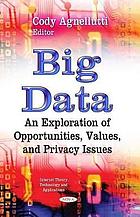Subject Guides
Weapons of Math Destruction, Common Read 2022
This guide is intended to help faculty and students engage with the 2022 Common Read book, Weapons of Math Destruction.
Special thanks to Vicky Ludas Orlofsky and Courtney Walsh of Stevens Institute of Technology for the foundation for this guide.
Ethics in AI
The Ethics of Big Data
"Big Data processes codify the past. They do not invent the future. Doing that requires moral imagination, and that's something only humans can provide. We have to explicitly embed better values into our algorithms, creating Big Data models that follow our ethical lead. Sometimes that will mean putting fairness ahead of profit." (p. 204)
Guides
-
A Beginner’s Guide to Data EthicsBig Data at Berkeley
August, 2020 -
Ethical Algorithm Design Should Guide Technology RegulationBrookings Institution
January 2020 -
The Financial Modeller's ManifestoWilmott
January, 2009 -
Princeton Web Transparency & Accountability ProjectCenter for Information Technology Policy
Princeton University
As mentioned in WMD.
Articles
-
The Fight to Reclaim AIMIT Technology Review
July/August, 2021 -
Why We Need to Audit AlgorithmsHarvard Business Review
November, 2018 -
MBA Rankings: Why Are Schools Willing To Cheat?Poets & Quants
July, 2018 -
Lies, Damned Lies and RankingsInside Higher Ed
July, 2018 -
The Perfect (Mis)Match: Algorithms and IntentionsEthics Unwrapped
undated (c. 2018)
Books on the Ethics of Big Data
Books on the Ethics of Big Data
Off-campus users will be prompted to log in to read these books using their Binghamton username and password.
-
Towards a Code of Ethics for Artificial Intelligence by Paula Boddington
Call Number: EbookISBN: 3319606484Publication Date: 2017 -
 Big Data: An Exploration of Opportunities, Values, and Privacy Issues
by
Cody Agnellutti
Call Number: EbookISBN: 9781633213982Publication Date: 2014-01-01
Big Data: An Exploration of Opportunities, Values, and Privacy Issues
by
Cody Agnellutti
Call Number: EbookISBN: 9781633213982Publication Date: 2014-01-01
Ethical Standards
Ethical Standards
“Algorithms are only going to become more ubiquitous in the coming years. We must demand that systems that hold algorithms accountable become ubiquitous as well” (p. 231).
Scholars from around the world have been discussing the issue of ethics in AI and devising standards and principles to guide ethical usage.
The AI4People group (linked below), in surveying AI opportunities and risks (see image), developed the following principles based on traditional bioethics principles (1-4) and adding one:
- Beneficence: Promoting Well-Being, Preserving Dignity, and Sustaining the Planet
- Non-maleficence: Privacy, Security and “Capability Caution”
- Autonomy: The Power to Decide (Whether to Decide)
- Justice: Promoting Prosperity and Preserving Solidarity
- Explicability: Enabling the Other Principles Through Intelligibility and Accountability

"Overview of the four core opportunities offered by AI, four corresponding risks, and the opportunity cost of underusing AI", Floridi et al., 2018 (see link below)
-
AI4People-An Ethical Framework for a Good AI Society: Opportunities, Risks, Principles, and RecommendationsFloridi, L., Cowls, J., Beltrametti, M., Chatila, R., Chazerand, P., Dignum, V., Luetge, C., Madelin, R., Pagallo, U., Rossi, F., Schafer, B., Valcke, P., & Vayena, E. (2018). AI4People-An Ethical Framework for a Good AI Society: Opportunities, Risks, Principles, and Recommendations. Minds and machines, 28(4), 689–707. https://doi.org/10.1007/s11023-018-9482-5
- Last Updated: Jul 26, 2023 1:39 PM
- URL: https://libraryguides.binghamton.edu/wmd2022
- Print Page